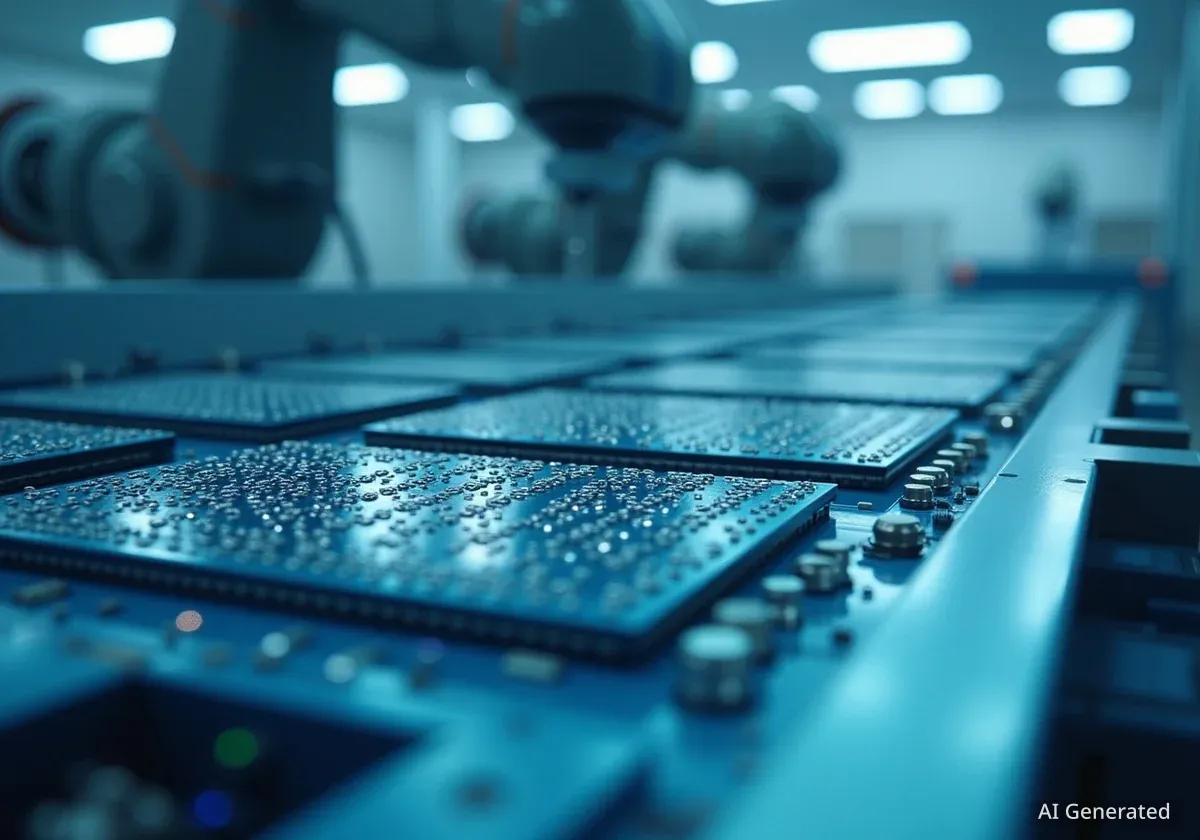Taiwan Semiconductor Manufacturing Company (TSMC), a critical producer of advanced microchips, has seen its stock value increase significantly this year, driven by surging demand from the artificial intelligence sector. The company's position as a leading foundry for major technology firms places it at the center of the ongoing AI expansion.
Despite a recent market pause following economic remarks from the Federal Reserve, TSMC's fundamental business model remains strong. The company manufactures essential components for leaders like Nvidia and Advanced Micro Devices, whose products power AI systems for companies such as Amazon and Microsoft.
Key Takeaways
- Taiwan Semiconductor Manufacturing Company (TSMC) is a leading chip foundry, producing semiconductors for many of the world's top technology companies.
- The company is a primary beneficiary of the artificial intelligence boom, as it manufactures the advanced chips required for AI applications.
- TSMC's business is diversified, with significant revenue from sectors including high-performance computing, smartphones, automotive, and the Internet of Things (IoT).
- The company's stock has performed strongly, rising 38% year to date, with a forward 1-year earnings valuation of 24 times.
TSMC's Role as a Foundational Chip Manufacturer
Taiwan Semiconductor Manufacturing Company operates as a pure-play semiconductor foundry. This means it does not design its own branded chips but instead manufactures them on behalf of other companies. This business model allows it to serve a wide range of clients, from small startups to global technology giants.
Companies that design chips, often called "fabless" companies, rely on foundries like TSMC to turn their designs into physical products. This specialization has allowed TSMC to achieve a dominant position in the market, particularly in the production of the most advanced and smallest transistors, which are essential for high-performance computing.
Understanding the Foundry Model
The semiconductor industry is largely divided into three types of companies: Integrated Device Manufacturers (IDMs) that design and build their own chips (e.g., Intel), fabless companies that design chips but outsource manufacturing (e.g., Nvidia, AMD), and pure-play foundries that only manufacture chips for others (e.g., TSMC). TSMC's focus on manufacturing has enabled it to invest heavily in cutting-edge fabrication technology.
TSMC's client list includes some of the most prominent names in technology. This strategic position makes it an indispensable part of the global electronics supply chain, from smartphones to data centers.
The Connection Between AI and Semiconductor Demand
The rapid growth of artificial intelligence has created an unprecedented demand for powerful processors. AI models, especially large language models and generative AI, require massive computational power for both training and inference. This has directly translated into increased orders for the high-end chips that TSMC produces.
Companies like Nvidia and Advanced Micro Devices (AMD) have seen soaring demand for their graphics processing units (GPUs), which are well-suited for AI workloads. As these companies do not have their own manufacturing facilities, they depend on TSMC to produce these complex chips at scale.
Manufacturing for AI Leaders
TSMC is the primary manufacturing partner for the advanced GPUs designed by Nvidia and AMD. As cloud service providers like Amazon Web Services and Microsoft Azure expand their AI capabilities, their need for these chips grows, creating a continuous stream of business for TSMC.
The demand is not limited to GPUs. Custom AI accelerators and high-performance central processing units (CPUs) also rely on TSMC's advanced manufacturing processes. The company's ability to produce chips with smaller and more efficient transistors is crucial for improving the performance and energy consumption of AI hardware.
Financial Performance and Market Valuation
TSMC's strategic importance is reflected in its stock performance. The company's stock, listed on the New York Stock Exchange under the ticker TSM, has gained 38% year to date. This growth highlights investor confidence in its central role in major technology trends.
According to market data, the stock trades at a valuation of 24 times its forward 1-year earnings. This metric is often used by analysts to gauge a company's stock price relative to its anticipated profits. While the stock has seen significant gains, its valuation remains a key point of analysis for market watchers.
The broader market recently experienced a slowdown after comments from Federal Reserve Chairman Jerome Powell. The Fed implemented a quarter-percent interest rate cut but also noted concerns about rising unemployment. According to reports, two additional rate cuts are planned for October and December, reflecting an effort to stimulate economic expansion and job growth without causing high inflation.
"Economic policies from central banks can create short-term market volatility, but the underlying technological trends, such as the adoption of AI, often drive long-term growth for foundational companies in the supply chain."
Diversified Business Beyond Artificial Intelligence
While AI is currently a major growth driver, TSMC's business is not solely dependent on it. The company maintains a diversified portfolio, manufacturing chips for a variety of end markets. This diversification provides resilience and stability to its revenue streams.
Key business segments for TSMC include:
- Smartphones: A long-standing core of its business, producing processors for major smartphone brands.
- High-Performance Computing (HPC): This segment, which includes AI chips, also covers processors for data centers, servers, and supercomputers.
- Automotive: The increasing complexity of vehicles, including autonomous driving features and in-car infotainment systems, requires more advanced semiconductors.
- Internet of Things (IoT): This category includes chips for a wide range of connected devices, from smart home gadgets to industrial sensors.
Before the recent AI surge, TSMC was already a leader in manufacturing chips for gaming consoles and personal computers. These established markets continue to be an integral part of its operations, ensuring that the company is not over-exposed to a single sector.
This broad base of operations means that TSMC is positioned to capitalize on multiple long-term technology trends simultaneously. As more devices become intelligent and connected, the demand for the advanced chips that TSMC produces is expected to continue across various industries.





